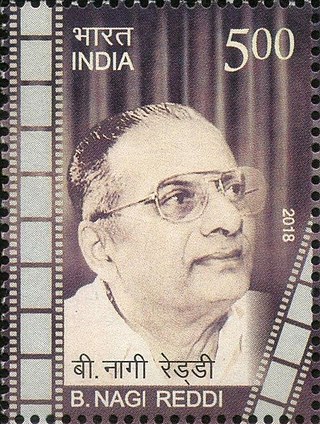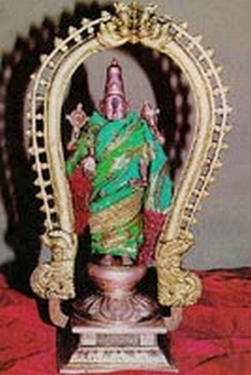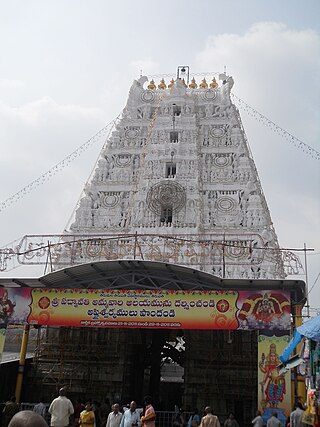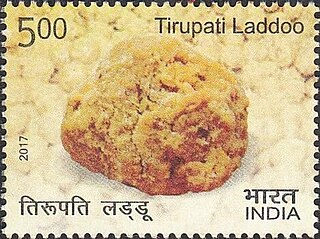
Vaikuntham Queue Complex is a facility used in Tirumala Venkateswara Temple, Tirumala by Tirumala Tirupati Devasthanams (TTD) for queue management. The complex serves as the entry point for all darshans and there are very few exceptions.

Vaikuntham Queue Complex is a facility used in Tirumala Venkateswara Temple, Tirumala by Tirumala Tirupati Devasthanams (TTD) for queue management. The complex serves as the entry point for all darshans and there are very few exceptions.
The mid-1970s saw a sudden spike in the pilgrim inflow to the temple with rapid improvements in access to Tirupati and Tirumala. TTD added hundreds of cottages on the hills in Tirumala but could not address the crowd management fully. With the lack of infrastructure to hold pilgrims, the temple witnessed serpentine queues outside the temple and during peak season circling the 4 mada streets. TTD under the leadership of Sri P.V.R.K. Prasad (Executive Officer) and B.Nagi Reddy (Chairman, Board of Trustees) planned for a queue complex system that could hold 14,000 people as a solution for crowd management. [1] Work began in 1980 and was completed in 1983. The then Chief Minister N. T. Rama Rao inaugurated the facility in 1983. [2]
Modifications were made to the queue complex by additional rooms on the north western side of the temple in 1985 but those have been removed and replaced by a second queue complex in 2000 that is located down the road from the first queue complex.
At present, Queue complex-1 (old) caters to all Arjita Seva, Special Darshan (Paid Darshan), Cellar Ticket ticket holders. Pilgrims opting for Sarvadarshan (free entrance) are sent through Queue complex-2 (new).

The Vaikuntham Queue complex is a semicircular building and opens into a garden maintained by TTD. The complex is situated on the southwest corner of the temple and is separated from the temple by the South Mada Street. The building has three levels in total and there are 19 halls in each level. Each hall has two doors - one for allowing pilgrims into the hall and the other for pilgrims to exit the hall and enter the corridor leading to the temple. The corridors connect to the southeast end of the temple by an overhead bridge. After the descent, the pilgrims turn around the corner and enter the temple through the main gopuram . To ensure pilgrims entering the temple for various activities are allowed at the same time, there are 2 queues and attendants inside the gopuram route the pilgrims appropriately.
Inside the holding areas and rooms, TTD provides free food, fresh milk as well as medical aid facilities. Sanitary needs are also taken care of. Each compartment is provided with LED TV telecasting Sri Venkateswara Bhakti Channel(SVBC), a TTD-owned Devotional channel.
The entrance to the Vaikuntham Queue complex is staffed by Police, security and temple officials. For Arjita Seva ticket holders, the tickets are checked manually before allowing pilgrims inside the complex. Various sign boards indicate the location of the room where pilgrims need to report for their darshan or seva. Outside the room, the ticket is checked along with the fingerprints and (as necessary) face matches with the biometric data provided at the time of ticket purchase. Just before entering the temple, there is a baggage scanner to check bags carried inside the temple. Pilgrims are asked to exit the queue complex and deposit mobile phones and cameras, if present - a scenario that could delay darshan . Inside the queue complex as well as in the temple (leading right to the sanctum sanctorum), TTD has installed security cameras to oversee pilgrims' movements.

Venkateswara, also known as Venkatachalapati, Balaji and Srinivasa, is a major deity in Hinduism. Described as a form of Vishnu, he is the presiding deity of Venkateshwara Temple, Tirupati. His consort, Padmavathi is an avatar of Lakshmi.

Tirumala Tirupati Devasthanams (TTD) is an independent government trust in India which manages various temples, including the Tirumala Venkateswara Temple in Andhra Pradesh. The trust oversees the operations and finances of the richest and the most visited religious center in the world. It is also involved in various social, religious, literary and educational activities. TTD is headquartered at Tirupati and employs about 16,000 people. Srivani trust was set up by TTD in 2019 to promote Sanātana Dharma by constructing temples in SC-ST-BC habitations, renovating ancient temples, and providing funds under Dhup-Deepa-Naivedyam Scheme to those temples facing financial difficulty. By January 2023, TTD has taken up construction of 2,068 temples in Andhra Pradesh, Telangana, Pondicherry and Karnataka. TTD's main source of income is Srivani darshan tickets which were earning it Rs 1 crore per day in January 2024.

Tirumala is a spiritual place in Tirupati district of the Indian state of Andhra Pradesh. It is one of the neighbourhoods of the Tirupati city. The town is a part of Tirupati Urban Development Authority and located in Tirupati (urban) mandal of Tirupati revenue division. It is a hill town where Tirumala Venkateswara Temple is located, a popular shrine of Vishnu. The town is strictly vegetarian.

Tirupati is a city in the Indian state of Andhra Pradesh. It is the administrative headquarters of the Tirupati district. The city is home to the important Hindu shrine of Tirumala Venkateshwara Temple and other historic temples. It is located at a distance of 150 km from Chennai, 250 km from Bangalore, 406 km from Amaravati. It is one of the eight Svayam vyakta kshetras dedicated to Vishnu. Tirupati is a municipal corporation and the headquarters of Tirupati (urban) mandal, Tirupati (rural) mandal, and the Tirupati revenue division.

The Sri Venkateswara Swami Temple is a Hindu temple situated in the hills of Tirumala at Tirupati in Tirupati district of Andhra Pradesh, India. The temple is dedicated to Venkateswara, a form of Vishnu, who is believed to have appeared on the earth to save mankind from trials and troubles of Kali Yuga. Hence the place is also known by the name Kaliyuga Vaikuntha and the deity here is referred to as Kaliyuga Prathyaksha Daivam. The temple is also known by other names like Tirumala Temple, Tirupati Temple and Tirupati Balaji Temple. Venkateswara is known by many other names: Balaji, Govinda, and Srinivasa. The temple is run by Tirumala Tirupati Devasthanams (TTD), which is under control of Andhra Pradesh Government. The head of TTD is appointed by Andhra Pradesh Government.

Bommireddy Nagi Reddi was an Indian film producer and director mainly in Telugu cinema. He set up Vijaya Vauhini Studios in Chennai, which was then Asia's biggest film studio. As his elder brother had the same initials and was known as B. N. Reddi, Nagi Reddi was popularly known as B. Nagi Reddi. Some of the movies produced by Nagi Reddi include Patala Bhairavi (1951), Missamma (1955), Maya Bazaar (1957), Gundamma Katha (1962), Maduve Maadi Nodu (1965-Kannada), Enga Veetu Pillai (1965), Ram Aur Shyam (1967), Nam Naadu (1969-Tamil),Shriman Shrimati (1982), Julie (1975), and Swarg Narak (1978), the latter two of which were in Hindi. Reddi has served as the president of Film Federation of India twice, in 1960–61 and 1962–63.

Ananda Nilayam is the glittering gold-plated gopuram of the Sanctum Sanctorum of the Tirumala Venkateswara Temple. According to Vaishnava philosophy, gopurams of the sanctum sanctorum are named:

Koluvu Srinivasa is an idol of Lord Venkateswara in the Tirumala Venkateswara Temple, Andhra Pradesh. This silver idol that resembles the main deity represents the presiding officer for all activities and rituals in the temple. Koluvu Srinivasa is regarded as the guardian deity of the temple and presides over all its financial and economic affairs. The idol is also called as Bali Bera. The duties of the Bali Bera closely resemble that of the householder. He manages the finances and accounts, and his permission is sought before offering Bali to Nityasuris like Garuda, Hanuman and Vishvaksena on the Balipeetham. There is no recorded history of the deity leaving the innermost 16-pillared hall.

Pavitrotsavam is an annual ritual in the Tirumala Venkateswara Temple, Andhra Pradesh. Pavitrotsava is derived from the combination of two words Pavitra (holy) and utsava (festival). This utsava is penitential as well as propitiatory and its main objective is to get rid of the evil that might have been caused due to omissions and commissions in the performance of various rituals throughout the year. The festival is also known as Dosha Nivaarana ,Sarva Yajna Phalapradha ,Sarva Doshopasamana, Sarva Tushtikara, Sarvakaamapradha, Sarvalokasantida.
Vasanthotsavam is an annual Seva celebrated in Tirumala to celebrate the arrival of spring season.
Sri Venkateshwara Swami Temple is a landmark vaishnavite temple situated in the hill town of Tirumala at Tirupati in Chittoor district of Andhra Pradesh, India. The Temple is dedicated to Lord Venkateswara, an incarnation of Vishnu, who is believed to be appeared here to save mankind from the trials and troubles of Kali Yuga.

Alipiri Padala Mandapam or Alipiri is the place at foot of seven hills in Tirupati, the pilgrim city of Sri Venkateswara Swami, in the state of Andhra Pradesh, India. It is a neighbourhood of Tirupati city.

Padmavathi Temple is a Hindu temple dedicated to the deity Padmavathi (Alamelumanga), the consort of Venkateswara. The temple is situated in Tiruchanur area of Tirupati city in Tirupati district of Andhra Pradesh, India.

Tirupati Laddu or SriVari Laddu is the laddu sweet offered as Naivedhyam to Venkateswara at Tirumala Venkateswara Temple in Tirupati, Tirupati district, Andhra Pradesh, India. The laddu is given as prasadam to devotees after having the darshan in the temple. The laddu prasadam is prepared within the temple kitchen known as 'Potu' by the temple board Tirumala Tirupati Devasthanams. Tirupati Laddu received Geographical indication tag which entitles that only Tirumala Tirupati Devasthanams can make and sell it.
Venkateswara Temple is an important Vaishnavite temple situated in the hill town of Tirumala in Tirupati of Andhra Pradesh, India. The Temple is dedicated to Venkateswara, an incarnation of Vishnu, who is believed to be appeared here to save mankind from trials and troubles of Kali Yuga. The temple is situated at a height of 853 m (2,799 ft) on Tirumala Hills which are part of the Seshachalam Hills and is constructed in Dravidian architectural style.

Sri Prasanna Venkateswara Swamy Temple is a temple at Appalayagunta, Tirupati located in Tirupati district of Andhra Pradesh, India. The temple is dedicated to the Hindu deity Venkateswara, referred to as Prasanna Venkateswara. Unlike other typical Venkateswara temples, the presiding deity has its right hand in Abhaya posture.

Kalyana Venkateswara Temple is an ancient Hindu temple at Srinivasamangapuram in Tirupati. It is located in Tirupati District of Andhra Pradesh, India. The temple is dedicated to the god Venkateswara, a form of Vishnu and is referred to as Kalyana Venkateswara. The temple is one of the centrally protected monuments of national importance.

Venkateswara Temple is a Vaishnavite temple situated in the town of Dwaraka Tirumala of Eluru district of the Indian state of Andhra Pradesh. The temple is dedicated to Lord Venkateswara, an incarnation of Vishnu. The temple is also known by other name like Chinna Tirupati meaning Small Tirupati.
Venkateswara Temple is an important Vaishnavite temple situated in the hill town of Tirumala in Tirupati district of Andhra Pradesh, built by a Tamil king Tondaiman and later expanded and renovated under the Chola and Vijayanagara Empire. The Temple is dedicated to Lord Venkateswara, an incarnation of Vishnu, who is believed to have appeared here to save mankind from the trials and troubles of Kali Yuga. The temple is situated at a height of 853 metres on Tirumala Hills which are part of Seshachalam Hills and is constructed in South Indian Tamil Architectural Style.